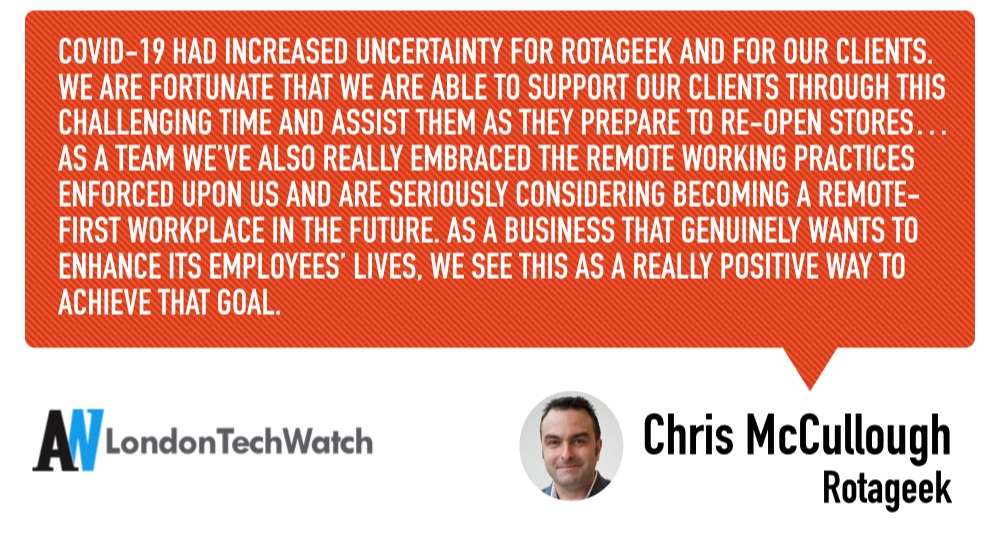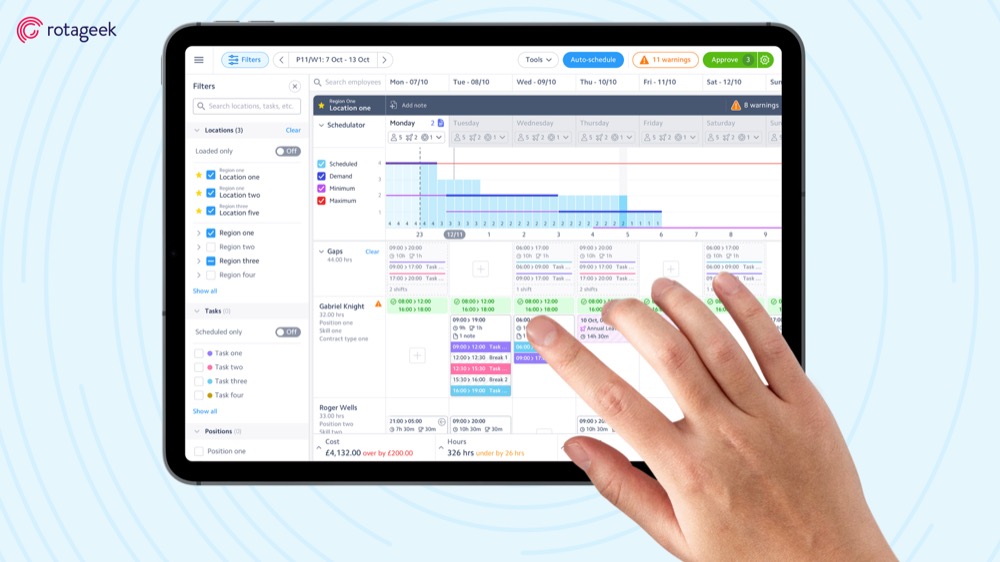Employee shift scheduling is fraught with issues including availability and shortage of employees, leading managers to spend more restless hours on scheduling, taking away valuable time from other responsibilities. Rotageek changes that by taking a data-driven approach to automate scheduling. The company’s platform uses machine learning to identify patterns, which may have gone unnoticed and the platform can generate millions of potential schedule combinations until the optimal one is created. Rotageek’s app makes it easier for staff to exchange and cover shifts, while adding a layer of transparency to who is working and when for management. While Rotageek is popular in the retail sector – its client list includes Prêt a Manger, Dune, Pets at Home, and O2 – the company is gaining traction in the health care space, where it is is currently offering a free, three-month trial for healthcare teams impacted by COVID-19.
London TechWatch sat down with CEO Chris McCullough to discuss Rotageek, how the platform is poised to play a role in helping retailers optimize operations once stores begin to reopen their doors, and the company’s recent funding round, which brings the total funding raised to £13.6M across seven rounds.
Who were your investors and how much did you raise?
Rotageek raised a Series B round totaling £6M. We are lucky to have a cohort of very supportive and engaged angel investors and investor groups like Venture Founders that backed this round along with institutional investors Calculus and Mobeus.
Tell us about the product or service Rotageek offers.
Rotageek uses cloud-based technology and automatic scheduling to help multi-site businesses manage and schedule staff to meet demand, drive efficiency, and reduce costs. The tool uses machine learning to identify patterns that may otherwise go unnoticed and its apps make it easier for staff to swap and cover shifts and know when they are working.
 What inspired the start of Rotageek?
What inspired the start of Rotageek?
I trained as a medical doctor spending 16 years in the NHS and 8 years as an Emergency Medicine Physician, at several London based hospitals, including St Mary’s Hospital. The difficulties of managing a shift-based, lean workforce provided me with the motivation to establish Rotageek, utilising Nick’s (Nick Mann, CTO and Cofounder) technological ability to create a relevant solution.
How is Rotageek different?
Other solutions create a set of ideal shifts to fit the demand and then do their best to fill them, leaving the final result far from optimal when shifts cannot be filled. Rotageek truly optimizes schedules by creating and assigning shifts in tandem, generating millions of combinations of schedules, and only proposing a final schedule where every shift is assigned to a worker.
What this means in practice is that we make scheduling co-operative and optimized. Staff have input into their schedules, for example with availability and work preference, while the organization ensures the optimal level of staffing.
What market are you targeting and how big is it?
Currently, we are targeting UK Headquartered High Street retail businesses and UK health. In total, this is a £100M annual ACV market
What’s your business model?
We are a B2B SaaS business that generates income on a recurring basis through a user license agreement.
How has COVID-19 impacted your business?
Covid-19 had increased uncertainty for Rotageek and for our clients. We are fortunate that we are able to support our clients through this challenging time and assist them as they prepare to re-open stores.
We also offered our solution to teams in the frontline of the Covid-19 crisis for free. This allowed us to take some to the scheduling burden off teams, allowing them to focus on delivering healthcare.
As a team, we’ve also really embraced the remote working practices enforced upon us and are seriously considering becoming a remote-first workplace in the future. As a business that genuinely wants to enhance its employees’ lives, we see this as a really positive way to achieve that goal.
What was the funding process like?
Fundraising is always tough. But there is an enjoyable element to it. One of the important factors for Rotageek is choosing our investors and then keeping them regularly updated.
This stood us in good stead as the COVID pandemic hit as we were negotiating terms sheets. Upfront, early, and honest communication allowed us to navigate the process swiftly, close the deal, and now focus on the business.
What are the biggest challenges that you faced while raising capital?
All fundraises require meticulous planning and focused execution. This fundraise was complicated with the uncertainty of the pandemic and lockdown. Ensuring that we were reacting appropriately as a business and communicating this rapidly shifting vision to our new and current investors was key.
What factors about your business led your investors to write the check?
Greg Blin, who led the Series A & B investments for Mobeus and who sits on the Rotageek Board: “Workforce management is crying out for innovation, as existing manual processes and legacy solutions are unable to effectively meet the demands of a modern-day enterprise workforce. RotaGeek’s technologically advanced proposition is proven to solve this issue, and effectively competes against much larger players. I’m delighted to continue to support this strong and capable management team from Series A to Series B.”
Alexander Crawford, Co-Head of Investments at Calculus: “We were attracted to Rotageek by the strength of their management team and their impressive technology, which delivers significant measurable returns for clients. The company has a strong client base in its core sector and with this investment is poised to expand into the global workforce management market, which is valued at over £3B. We are delighted that Rotageek is also in a position to assist the NHS at this difficult time.”
What are the milestones you plan to achieve in the next six months?
It’s our mission to create a step-change in scheduling to improve not only how businesses and organisations run their operations, but to also positively and significantly impact the lives of shift-based employees.
It’s our mission to create a step-change in scheduling to improve not only how businesses and organisations run their operations, but to also positively and significantly impact the lives of shift-based employees.
As a [former] doctor, I am particularly passionate about taking those benefits to the healthcare sector in the coming months and continuing to swiftly adapt to the changing world during this difficult time.
What advice can you offer companies in London that do not have a fresh injection of capital in the bank?
Cashflow – reduce cost, reduce risk, maintain revenue, support your clients In uncertainty, there is opportunity to deliver value to new clients – take a step back and reassess. You will need to take some tough decisions. Face into these and take them quickly.
Where do you see the company going now over the near term?
We plan to:
- work with a greater number of retailers both in the UK and abroad to add automated data-driven scheduling into their technology stack.
- Expand into the Healthcare Industry in the UK to assist with unifying and simplifying a really complex set of scheduling problems.
What is your favorite restaurant in London?
I’ve been vegetarian for a couple of years and though I don’t get out and about in London very often these days I’ve always favored Mildreds in Soho for an awesome meal and its cozy atmosphere.
You are seconds away from signing up for the hottest list in LondonTech! Join the millions and keep up with the stories shaping entrepreneurship. Sign up today






